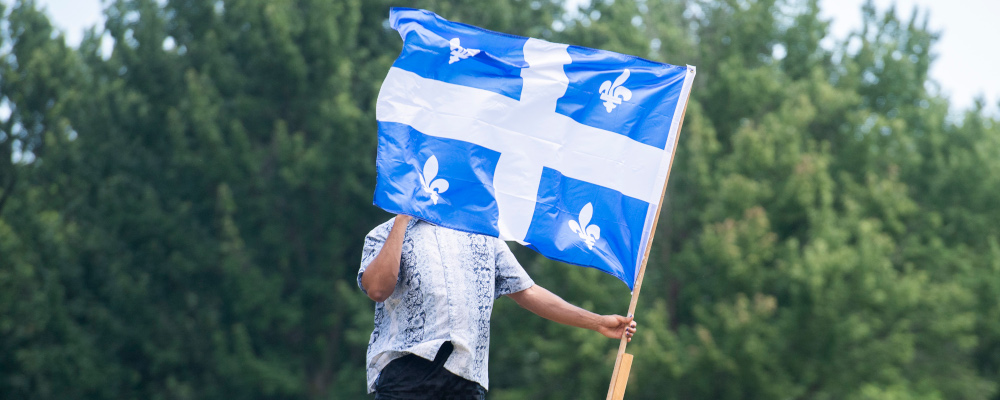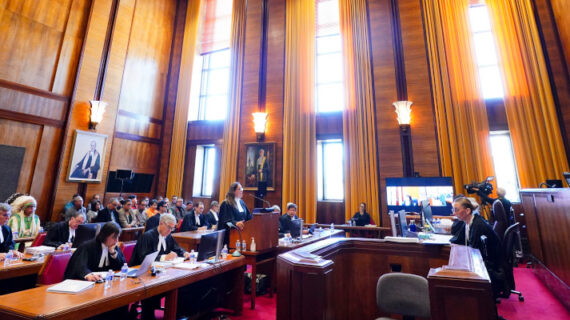The following is an excerpt from Quebec-based author and scholar Étienne-Alexandre Beauregard’s new book, Le retour des Bleus: Les racines intellectuelles du nationalisme québécois (Liber, 2024).
It has been acknowledged for years that the old cleavage between federalists and sovereignists has lost its edge in Québec politics. Other antagonisms now structure the political rivalry even though, until very recently, politicians and observers had trouble discerning the new opposition that would supplant the constitutional question. […]
In Le schisme identitaire, I analyzed the emergence in Québec of the identity question as the main political polarization factor after the collapse of the nationalist consensus arising from the Quiet Revolution. The issues of language, secularism, and immigration, which pertain to the question of the Nation State and the role the Québec State should play to defend the Francophone nation, have their own existence beyond the opposition between sovereigntists and federalists, and the Coalition Avenir Québec governments have proved how much these questions arouse lively debates in public opinion. Much more than economic quarrels, where arrangements are often possible, the symbolic universe of identity leaves very little room for rational and reasoned compromise. In this sense, lively political passions are being expressed today in Québec, and their intensity goes far beyond the sanitized debate we were promised on public finances, government efficiency, or tax rates. Without being incidental, these are not questions that break up friendships, divide families, and structure political cleavages. In this regard, only identity has supplanted sovereignty.

This being said, we would be wrong to think that the Québec identity question is specific to the 21st century or that it is only the local transposition of similar rifts embroiling other Western nations. On the contrary, the debate between conservative nationalism and liberal progressivism goes a long way back in our history. In 1839, the progressive Lord Durham wrote that the French Canadians had to abandon their nationality in the name of progress, that they remained “an old and stationary society in a new and progressive world”.1J. G. L. Durham, Le rapport Durham, p. 67. Their disappearance was, so to speak, inevitable, determined by the direction of history and required by the continent’s march toward progress. A few years later, in his History of Canada, François-Xavier Garneau responded to Durham by exhorting his compatriots to cherish their identity and adopt a conservative policy, without fear of opposing the alleged progress conceived for them, but without them. We consider Durham and Garneau as the respective fathers of the progressive Rouges and the conservative Bleus, two ideological families divided by their philosophical attitude towards the nation: is it a reserve of indispensable reference points for every individual and a legitimate way to gain access to modernity, or is it a cause of confinement and alienation when it is politicized? This fundamental question, which calls on the conception of human nature adopted by progressivism and conservatism, marks the history of Québec and is embodied in a renewed form in what is today called the identity debate.
[…]Since François-Xavier Garneau, the Bleus have defended a special kind of conservatism, a product of the peculiar situation of the Québec nation, whose culture is “scorned from the heights of a certain Anglo-Saxon modernity”, but also because “this community finds itself obligated to adopt a sufficiently consistent self-image to support its project of survival”.2J. Beauchemin, L’histoire en trop, p. 171 and 30. Faced with the depoliticization of identity desired by the Rouges, for whom a State must remain culturally neutral, and who thus would abstain from establishing institutions favouring the Franco-Québec nation, a substantial definition of the nation becomes necessary to support the idea of a Québec Nation-State. As Beauchemin affirms, “this impervious and constant desire to remain part of the history of peoples” is the deepest foundation of Québec nationalism, which has nurtured all its incarnations, “from the project of survival to the project of sovereignty”.3Ibid., p. 41. The election of the Coalition Avenir Québec is further evidence of the relevance of this distinction between nationalism and “indépendantisme”, with the former going beyond the latter in that it refers to the desire of the Québec nation to endure, be it inside or outside of Canada. The Bleus are nationalists above all, and find their unity in the field of identity instead of the constitutional question. These voters even form the majority if we judge by the frequent polls concerning Bill 21 and the protection of French, as well as immigration. Beyond the denigration that wrongly likens them to withdrawal, lack of self-confidence, and smallness, it is time to address the opposition between Rouges and Bleus head on.
The fact is that major points of convergence exist among the Honoré Mercier’s Parti National, Maurice Duplessis’ Union Nationale, René Lévesque’s Parti Québécois and François Legault’s Coalition Avenir Québec, the four political parties that have consolidated a nationalist majority in power since 1867. At the end of the 19th century, Mercier understood the necessity to “associate the destiny of the French-Canadian people with the State of the “Province de Québec”, the only political entity where the Francophone nation is a majority.4A. Tétreault, La nation qui n’allait pas de soi, p. 46. Under Maurice Duplessis, the Québec State was virtually absent from the economic domain, but it was nonetheless aware of its role as the “fortress that we must defend without failing […] that permits us to construct the schools which suit us, to speak our language, to practice our religion and to make laws applicable to our population”.5Maurice Duplessis, cited in H. F. Quinn, The Union Nationale. A Study in Quebec Nationalism, p. 117-118. For Duplessis, Québec was the political embodiment of a special cultural phenomenon. He fought against federal interference in Québec jurisdictions and adopted the contemporary Québec flag. René Lévesque was a worthy successor of this vision, seeing Québec as “the only place where it is possible for us to be really at home”.6R. Lévesque, Option Québec, p. 19. He worked to make it prouder and more French through the adoption of Bill 101, among other legislation. While the founder of the PQ was certainly a Social Democrat, we would be wrong to see him as a progressive, at least on the cultural questions that concern us. “Allergic to the “knights of the clean slate”, who dreamed of finishing with the past once and for all, and to certain doctrinaire minds who called for a “break” with history, René Lévesque at all times was a man of continuity. In his view, Québec, both modern and old, was a fortunate synthesis between loyalty to one’s roots, to the land, and an adventurous spirit, a sort of attraction for the open sea.”7É. Bédard, «René Lévesque et les Bleus», in A. Stefanescu, René Lévesque. Mythes et réalités, p. 157.

Nowadays, behind the electoral success of the Coalition Avenir Québec, there is certainly its ability to speak to “Bleu” Québec and its emotions, beyond the constitutional confrontation that monopolized the past fifty years. When he says that “the first duty of a Premier of Québec is to defend the Québec nation, the French language and its values”,8G. Lajoie, «Débat des chefs fédéraux en anglais: la nation québécoise “attaquée”». François Legault essentially sums up the expectation of Québec conservative nationalists that the Québec State protect this particular humanity under its responsibility. The CAQ’s popularity largely depends on its identity discourse. For the time being, it seems to be the political vehicle adopted by the majority of Bleu voters, who are tending to band together politically after being dispersed to the Left and Right, among the sovereigntists and the federalists. It will also be recognized that François Legault is not particularly unwilling to assume the mantle of Maurice Duplessis, a man who “had many faults, but [who] defended his nation”,9C. Lecavalier, «François Legault traite Gabriel Nadeau-Dubois de “woke”… qui l’accuse d’imiter Maurice Duplessis». unlike many neo-nationalists, who are uncomfortable with the Union Nationale past.
Québec Bleus should not be ashamed of identifying with conservative nationalism, which historically has promoted an original synthesis between nationality and modernity, between rootedness and progress, which has allowed us to remain “absolutely, doggedly ourselves”,10L. Groulx, Dix ans d’Action française, p. 131. while evolving over time. Being Blue means taking on the history of Québec, from New France to our times, without shame. It means trusting democracy and the Québec people instead of fearing them. It means defending a republican model of seeking the common good in the face of multiculturalist fragmentation. It means understanding that individual freedom has its limits and that it cannot flourish without a collective framework. It means knowing what is most precious is also the most vulnerable, and never fearing to protect it. Above all, it means refusing to give up on the pretext that the struggle would be lost in advance, that the Québécois are doomed to disappear, swallowed by irresistible “progress”. There is no shame in following in the footsteps of François-Xavier Garneau, Honoré Mercier, Lionel Groulx, Maurice Duplessis, René Lévesque and all those who loudly affirmed that the Québécois had the right and the duty to be masters in their own house and live on. On the contrary, this tradition is a reason to be proud, and today only asks to be taken on by its legitimate heirs.




